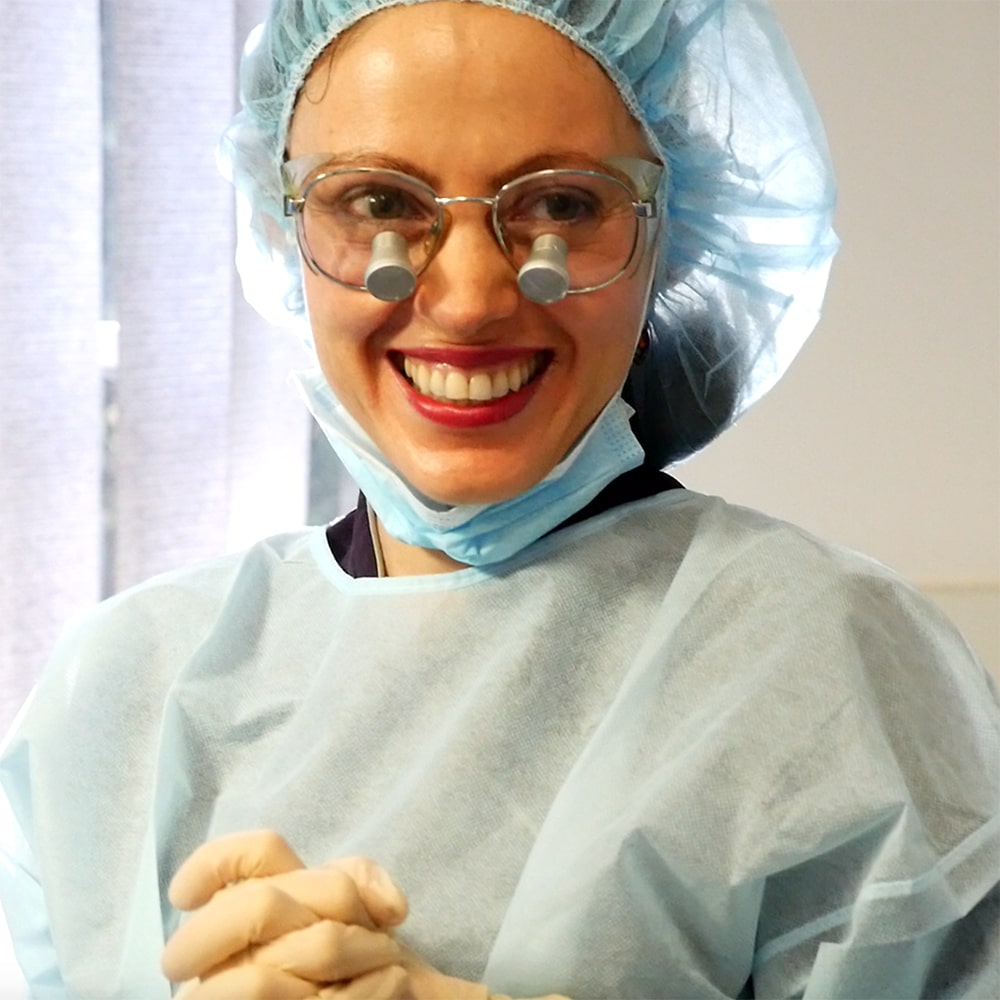Did you know that around 1 million dental implants are placed annually in Australia? According to the Australian Society of Implant Dentistry (ASID), this number will keep increasing considering how many Australians have missing teeth. This indicates that dental implant treatment is on the rise and is eagerly sought by patients.
Over the past years, implant dentistry has revolutionised how lost teeth are replaced. No longer do people want loose dentures or to damage their good teeth for the sake of a fixed bridge. People seek fixed, comfortable tooth replacement options that feel like their own teeth. However, implants are not a magic wand that will give you new teeth immediately. The process can take three to six months and even longer if bone grafting is required to regenerate missing bone. You must be patient and accept that implants carry associated complications.
In this article, I’ll help you understand if a single-tooth implant is worth it. I will go through the implant process, share the factors affecting the success of the implant surgery, and importantly consider the potential complications associated with a single tooth dental implant. So, let’s get started.
What are Dental Implants?
Dental Implants have two components: a titanium screw and a crown. The screw serves as a replacement for the tooth root, and the prosthetic crown replaces a natural tooth crown that you see in the mouth. A dentist will fit the titanium screw in the place of the missing tooth to which the crown anchors. Once the crown is in place, the implant will look, feel, and function similarly to a natural tooth.
Single Tooth Implants:
As the name suggests, if you are missing a single tooth, you can replace it with a single dental implant to complete your set of pearly whites. Implants can also be used in clusters. Let’s say you have three teeth missing, right next to each other. Two implants can hold a three-tooth bridge. In other words, two implants can replace three teeth.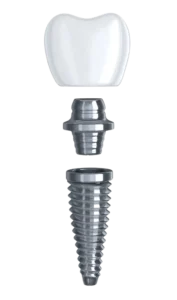
Who is the Right Candidate for Dental Implants?
Anyone who wants to replace missing teeth with something that mimics natural teeth better than any other option. You would have to be in reasonable health, be prepared for the process and care for your new implants as they are susceptible to failure if neglected. If you are a denture wearer who wants to throw your denture out, you would also be a perfect candidate for implants. Implants don’t rub your gums or cause sore spots. They fit seamlessly into your natural dentition and don’t trigger the gag reflex in prone individuals. After all, who wants a false tooth? Most people want to be able to replace a tooth with a tooth. Moreover, to do a dental implant, we don’t need to shave any adjacent teeth as we would for a bridge.
When getting a dental implant, you and your dentist will need to ensure you have:
- Healthy gums
- Good oral hygiene habits, which continue after dental implants are done. Regular dental visits to ensure long-term success are important.
- Enough bone volume to house an implant. However, if you don’t have adequate bone volume, don’t despair, you could be a candidate for bone grafting.
What are the Types of Dental Implants?
History holds many attempts at dental implants but the only modern version that stands the test of time is an “Endosteal titanium Implant”. The titanium implant is fitted into the jawbone and is allowed to integrate for three to five months before the crown is anchored to the implant.
Zirconia implants have become more popular in recent years but they have many limitations, so titanium implants are still the golden standard. However, in individuals with true titanium alloy allergy or in patients with a high aesthetic demand, zirconia implants could be an option.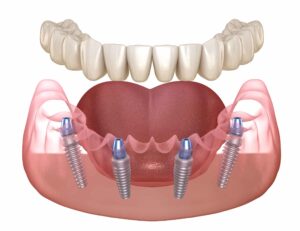
Is a Single Tooth Implant Worth It?
This is subjective. For some people, not having to wear a denture, being able to smile confidently, and not having discomfort when eating, is worth every penny. Yet, others find themselves not wanting to undergo surgery and opt for a less invasive, less costly denture or a bridge. If you are considering a single dental implant, there are several advantages to it:
-
Functional and health benefits
Opting for a single-tooth implant goes beyond just aesthetics. It has several functional and health benefits. My patient often read online that if they don’t replace a missing tooth, their cheeks or lips will sink in. There is no need to worry. Unless you are missing all your teeth, your lip and cheek contour will be maintained by other remaining teeth. However, in a similar way to books collapsing on your bookshelf if you remove just one book, even losing a single tooth can cause adjacent teeth to shift and compromise tooth alignment.
A single tooth implant helps restore function and allows you to chew, talk, and smile just like you would with your natural teeth.
-
Long-term investment
Let’s be honest, dental implants are not cheap – there is no pretending. Compared to regular dentures and bridges, single-tooth implants are a long-term investment. Implants may or may not outlast dentures and bridges, but you are less likely to spend on frequent repairs. Single tooth implants are durable and have high longevity provided they are done skilfully, and you look after them well, but they are unlikely to save you any money as some websites might suggest. With proper care and maintenance, single-tooth implants are an investment in your comfort, confidence and quality of life, and are well worth it for most people.
-
Higher comfort
There is no doubt that single tooth implants offer higher comfort, which is why many people opt for them. There is no chance of it moving and causing ulcers once the implant is fixed to your jawbone. Compared to dentures, single tooth implants provide greater stability.
-
No restrictions
With dentures, you might have to avoid crunchy and chewy foods. However, with single tooth implants, you don’t have such restrictions. With implants, you can eat just about anything you want.
-
Low maintenance
A single tooth implant is low maintenance. All it needs is to be flossed for 6 seconds a day. When you think about it, it is not a huge commitment. If you do it, long-term success is good and if you don’t, you are leaving it to chance. Regular dental visits for general dental checkups will help diagnose problems early or confirm the health of your implants.
What is the Process of Getting a Single Tooth Implant?
A single tooth implant will take three to five months to complete. However, if you don’t have enough bone volume for an implant and require a bone graft to regenerate bone, this could take an additional seven to nine months. So, in total, on average it could take anywhere from three months to a year before you have your new tooth.
Here are the steps:
-
Bone graft
If the surgeon determines that you don’t have sufficient bone for a dental implant, missing bone will need to be regenerated first, with a procedure that’s called a bone graft. Incredibly, we can grow body parts these days, even if it is on a small scale. You must wait five to nine months for the bone graft to integrate before the implant is placed.
-
Placement of the Implant
Placing an implant requires a minor oral surgery. A titanium implant is placed into your jawbone and the gum is sutured around it. In cases where the implant is immediately stable, this is all the surgery that’s needed and in other, where the bone is soft and doesn’t hold the implant firmly, the implant takes longer to fuse with your jawbone, a dentist might decide to bury the implant under the gum for the duration of the healing period, and expose it later with minor follow-up “exposure” surgery.
-
Crown placement
Many months in the making, now is finally the time to make your crown. A 3-D scan or an impression is all that is needed to record the measurements of your mouth and the position of your new implant to make you the crown. On average, it takes one to three weeks for the crown to be manufactured at a dental laboratory. The crown is then screwed into the internal thread of the implant. We will show you how to look after it at home and you are off to enjoy it!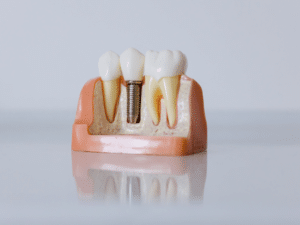
What are the Common Complications When Getting Dental Implants?
Although a dental implant is a common and safe procedure, as with any medical treatment, there are certain complications to be aware of. Knowing these complications helps you identify a possible issue promptly and contact your dentist for help or simple reassurance.
Early Complications
Early complications happen straight after the surgery or during the healing phase (3-5 months).
-
Infection
A mouth is full of bacteria. Some are beneficial and some are harmful. Insertion of an implant is a surgical procedure, during which bacteria from the mouth can seed around the implant and cause an infection. To minimise the risk, I usually prescribe antibiotics for a week post-surgery. However, despite every effort to prevent an infection, the little microorganisms that live in the mouth can defy all odds and still cause havoc. If caught early, the infection can be curbed, but often, an infection is our worst enemy and will cause an implant to fail. Don’t stress, after the healing period of a few months, we can have another go.
-
Allergic reaction
A dental implant is composed of Titanium alloy which is a combination of titanium oxide with smaller quantities of other metals. The exact proportions of metals will depend on the brand. In all my years of practice, I have not seen a true allergy to titanium alloy, but it is possible. Please read my article on the safety of dental implants (https://drhelen.com.au/are-dental-implants-safe/). If you suspect that you might be allergic to titanium alloy, you can have an allergy test before having implants.
-
Incision line opening
Another common postoperative complication is called “incision line opening”. It is simply medical jargon for wound opening. If it’s attended to promptly, it doesn’t cause serious long-term problems, but if not addressed promptly, it can result in an unexpected infection and bone loss. If you develop an ‘incision line opening’, contact your surgeon immediately so that they can nurse the would to until it is healed.
-
Bruising and swelling
Expect some bruising and swelling, it’s normal! Some people hardly bruise, but many do, some more than others. I will prescribe you medications such as Non-Steroidal Anti Inflammatory (NSAIDs) and corticosteroids to reduce swelling. However, if you get away without at least a bruise, count yourself lucky. All bruises and swellings subside and heal. Despite how nasty they look; they are nothing to worry about.
-
Nerve or tissue damage
If the dentist is experienced and careful, nerve complications are not very common with implant surgery. However, it is an important aspect to consider before undergoing single implant surgery. If you’ve ever had your wisdom teeth removed, you’d be already familiar with this nerve, as the risk of nerve injury with wisdom teeth removal is analogous to that of implant surgery.
If you are getting a single tooth implants in the upper jaw, there is no risk of nerve damage, since there are no nerves nearby.
However, the lower jaw has a critical nerve, the “Inferior Alveolar Nerve” (IAN). There is one on each side of the jaw. This nerve supplies sensation to the chin, lower lip and the teeth. This nerve can be affected temporarily or permanently post grafting or implant procedures. It is worth noting that this is not a movement nerve but purely sensory, so if there are any complications, you could end up with tingling or numbness in your lip and the chin on the affected side. Losing sensation in the lower lip will not cause loss of function. Your lip will have a normal range of movement, it will not droop, and no one will ever know.
-
Sinus complications
Sometimes, your implant can penetrate a Maxillary sinus (air-filled cavity in your face). Often, this doesn’t result in any serious complications, but at times a sinus infections can occur. If this occurs, a follow-up procedure is done either to remove the implant or modify it to resolve the infection.
-
Adjacent tooth injury
With careful planning, injury to adjacent teeth is uncommon. 3-D scanning and digital treatment planning allow a surgeon to visualise adjacent teeth before the surgery. If the roots of the neighbouring teeth are particularly close, a digitally prepared surgical guide will guide an implant into a precise, preplanned position. To minimise the risk, choosing an experienced surgeon is prudent.
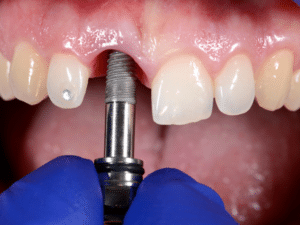
Delayed Complications
You can experience dental implant complications even years later.
-
Peri-implantitis
Are you a smoker? Do you have uncontrolled diabetes? Do you take bisphosphonates? If so, you might be prone to peri-implantitis. This condition is one of those delayed complications that isn’t understood and hence, has limited treatment options. However, continuous research is being conducted into this condition, and new treatment techniques are emerging.
With peri-implantitis, bony support around your implant is lost. It is similar to periodontitis, a gum disease that causes teeth to lose bone support. To prevent peri-implantitis, follow your surgeon’s advice and precise home care routine. However, you must understand that if your teeth are naturally not built to last forever, no amount of money you spend can get you the balance between nature’s will and the magic we do.
-
Damage due to force
Too much force on the implant can cause it to become overloaded. This could be a result of grinding your teeth at night or a heavy bite on the implant. Your dentist should take particular care in adjusting your bite in a way that doesn’t place undue force on it. If you grind and clench (a condition called nocturnal bruxism) your teeth in your sleep, wearing a protective occlusal splint at night is a must! Please believe me when I say this. Nocturnal bruxism causes a lot of damage to both your natural dentition as well and implants.
-
Prosthetic complications
Prosthetic complications related to dental implants can arise due to several factors. Common issues include loosening of the implant crown, which can occur from time to time without any damage to the components, provided the screw is tightened by a dentist promptly. Fracture of the crown or the prosthetic screw that attaches the crown to the implant, may happen under excessive biting forces or due to normal wear over time. Bite overload, where the implant bears too much force, can also cause complications, such as implant failure or damage to the surrounding bone. If you have been advised or suspect that you grind your teeth in your sleep, it is paramount to wear a protective occlusal splint (grinding plate) at night. Regular follow-ups and attentive care are essential to minimise the risk of prosthetic complications.
Preventive Care Steps for Single Tooth Implant
Now that my work has been done, it is in your hands to care for your new implant. All it takes is a few seconds a day to keep it clean and keep harmful bacteria away. People often listen to my advice early on but later forget how important it is to look after their implants. I can’t stress enough how important your role is in keeping the implant in your jaw. With a few simple steps, you can prolong its longevity:
- Floss each side of the implant for three seconds each day. That’s a total of 6 seconds a day – that can’t be too hard!
- Get a dental checkup every six months. It gives your dentist a chance to spot any issues early on.
- Don’t smoke
- If you grind, wear an occlusal splint at night to protect your implant from overload
What are the Factors Affecting the Success of Single Tooth Implant Procedures?
Although single tooth implants have become a popular procedure, some factors can affect their success. Knowing these factors can empower you to look after your health and give your implant the best chance of success.
-
Smoking
Do you smoke? If so, it can affect the overall success of a single tooth implant. Now, this doesn’t mean you aren’t a candidate for an implant. People who smoke can still have implants but the chance of both short-term and long-term success is reduced.
Smoking reduces the blood circulation in the jawbone. It can affect your healing after implant surgery. Hence, it is advised to avoid smoking for at least two weeks before your surgery and after the surgery. Even better quitting smoking is the best way. I know this is easier said than done.
-
Gum Diseases
Bacteria involved in active gum disease (marginal gingivitis or adult periodontitis) can affect your natural teeth as well as implants. Hence, treat your gum disease before you get a single tooth implant.
-
Medical Conditions
If you have other medical conditions, such as uncontrolled diabetes, the chance of dental implant failure is higher. Uncontrolled diabetes slows down your natural healing ability, as well as implant osseointegration (the process of fusion of the implant with the jawbone) is affected. With the help of your medical doctor, diabetes should be stabilised before undergoing dental implant surgery. People who have stable diabetes are no more prone to implant problems than any other healthy individuals.
-
Medications
Medications such as bisphosphonates and Denosumab, commonly used in the treatment of osteoporosis, can inhibit bone’s ability to heal, and therefore increase the risk of implant failure as well as wound healing. Your dentist and your medical practitioner will need to assess your suitability for implants carefully. If you are receiving chemotherapy or radiotherapy, again a decision to proceed with implants should be exercised with caution.
-
Inexperienced surgeon
To have a skilled and experienced dentist perform your surgery is critical. However, you must also ensure the surgeon is compassionate, kind and cares about the outcome. One of the best things for any surgeon is to experience the patient’s joy after a successful treatment. Your surgeon must be honest, transparent, and invested in the treatment from start to finish and later. How to find an experienced implant dentist? Ask your friends or a doctor for a recommendation. Online reviews can be helpful but we all know to treat them with caution. Meet a few dentists. Ask them questions, and see how you feel about working with them.
Always remember surgery is not a walk in the park. You want to be one of the 9 in 10 for whom everything works out wonderfully rather than 1 in 10 who face complications.
-
Poor oral health maintenance
A tooth implant will never be as good as your natural tooth. Getting a single tooth implant doesn’t reduce your responsibility to maintain oral health. Instead, it should make you more vigilant. Poor oral health can reduce the longevity of the single tooth implant. You must clean and maintain your teeth adequately to increase the longevity and durability of single tooth implants.

How Much Does It Cost to Get a Single Tooth Implant?
The average cost of a single tooth implant in Australia is $3,500 to $7,500. However, the cost can vary based on different factors, such as the location of the dental clinic, the complexity of the procedure, and the dentist’s experience.
If you need a prior treatment, such as bone grafting or treating gum disease, it will add to the overall cost.
Are Single Tooth Dental Implants Safe?
A dental implant is a replacement for a missing body part. As with any other medical procedure, all factors need to be taken into account. Despite the different factors and potential complications associated with dental implants, it is generally regarded as a safe procedure.
When you get a single tooth dental implant from an experienced and qualified dental implant dentist, the rate of success increases drastically.
What’s next?
If you have any further questions about the information contained in this article or would like to discuss your situation, feel free to contact us at Dr Helen’s Dental & Implant Studio.


